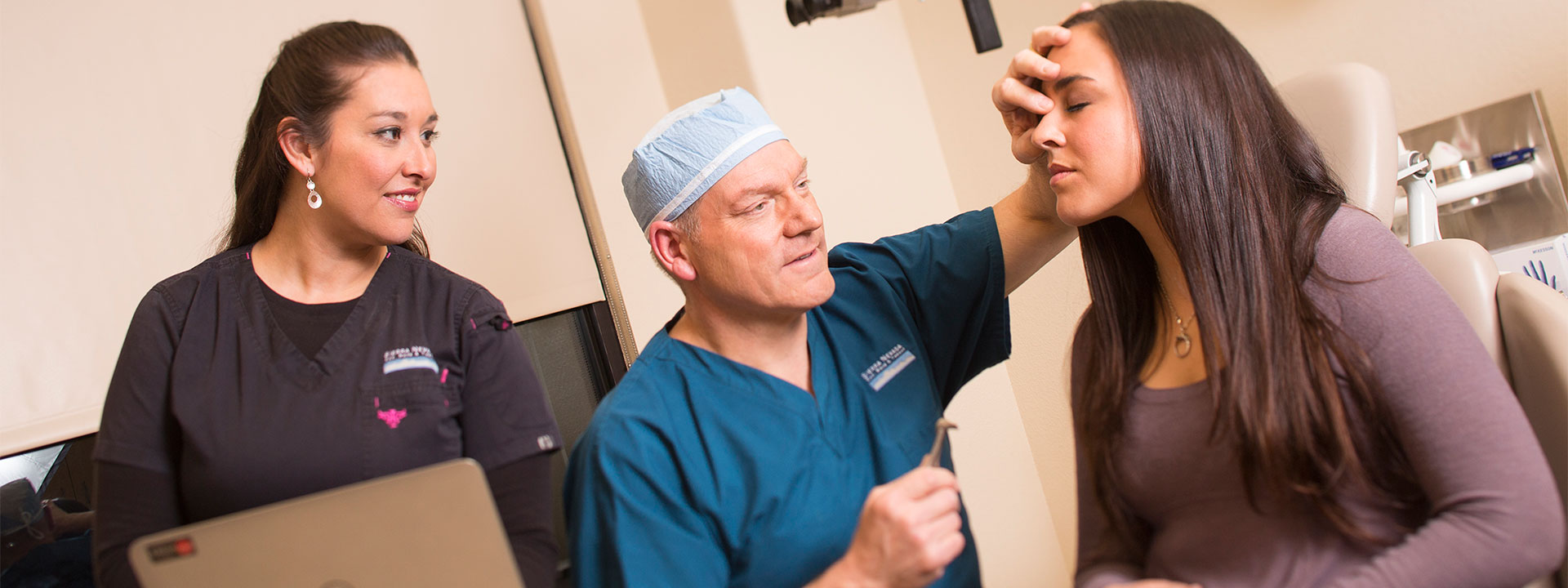Turbinate hypertrophy is a type of nasal and sinus issue. Blockage occurs when turbinates in the long, narrow nasal passageways are enlarged and begin to impair proper airflow, which can lead to nasal breathing problems. However, it is treatable with the proper over-the-counter or prescription medicines or surgical treatments.
There are technically three turbinates on each side of the nose–the superior turbinate is positioned highest in the nasal cavity, followed by the middle turbinate, then the inferior turbinate. Turbinate hypertrophy can occur anywhere along the nasal passageway, as turbinate tissue swells or pushes against the nasal septum. However, it occurs most frequently between the middle and inferior turbinates, and may also be referred to as inferior turbinate hypertrophy or nasal turbinate hypertrophy.
Turbinate hypertrophy symptoms often resemble those of other nasal or sinus conditions. That is why it is best to obtain a proper diagnosis from an ear, nose and throat (ENT) specialist such as the doctors at Sierra Nevada ENT.
Symptoms of Turbinate Hypertrophy
Symptoms of turbinate hypertrophy vary with each individual person. These symptoms can be temporary or life-impacting depending on the severity and duration, and can be impactful if left untreated.
Common symptoms of turbinate hypertrophy include:
- Chronic mouth breathing
- Altered sense of smell
- Runny nose
- Snoring
- Extended nasal congestion
- Mild facial pain
- Difficulty sleeping
- Difficulty breathing
- Nosebleeds
These symptoms are akin to having a cold that won’t go away and may be related to another condition referred to as nasal septal deviation.
If you are experiencing these symptoms, contact us today to see how we can help your turbinate hypertrophy. 
What Causes Turbinate Hypertrophy?
Turbinate hypertrophy is often caused by a bodily response from inspiring different environmental and seasonal allergens, or the result of experiencing chronic sinus inflammation.
Potential causes of turbinate hypertrophy include:
- Allergic rhintis
- Non-allergic rhintis
- Upper respiratory infection
- Medications
- Hormonal changes
Other factors that can exacerbate turbinate hypertrophy include:
- Deviated septum
- Nasal valve collapse
- Nasal deformity
- Nasal disease
Turbinate Hypertrophy Treatments
Treating turbinate hypertrophy depends on the specific issue at hand. It’s best to see an ENT (Ear, Nose, and Throat) specialist to have your nose examined for a diagnosis. Once determined to be turbinate hypertrophy, there are many options available to alleviate your symptoms:
Medical therapies can include a nasal spray to alleviate symptoms. There are several that may be offered:
- Nasal saline sprays or rinsing
- Nasal antihistamine sprays
- Nasal steroid sprays
- Allergy testing and injections may be required if the above do not control symptoms.
Turbinate Surgery
In the case that medicinal therapies haven’t improved your symptoms, surgery may be an option. Typically, an ENT specialist will surgically decrease the size of the turbinate to increase airflow of the passageway while preserving its functionality. This can often be performed in the office.
Finding a Treatment That Works Best For You
Sierra Nevada ENT has been providing specialized ear, nose and throat services since 1995. Our team takes a comprehensive approach to resolving turbinate hypertrophy by creating an individualized treatment plan. This plan is based on a variety of factors, including the frequency, duration and severity of your symptoms, as well as an examination of your sinuses. In some cases, we also refer patients for imaging or allergy testing.
Our goal with both surgical and non-surgical turbinate hypertrophy treatment options is to help to clear nasal passages, encourage nostril breathing and provide relief to our patients.
Book a Consultation
Here at Sierra Nevada ENT we are dedicated to resolving your ear, nose, or throat problems with treatment plans tailored to your individual needs. Contact us today to book a consultation.
Our Offices
Check our individual location pages for the office nearest you. Our office hours vary per location.Visit one of our locations today.
